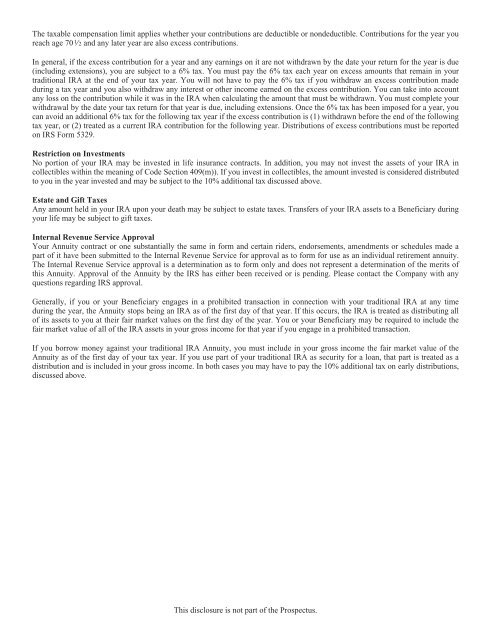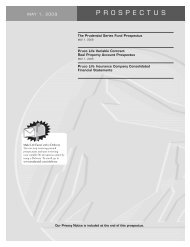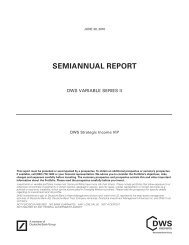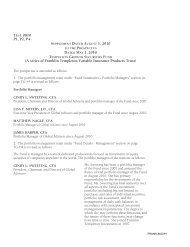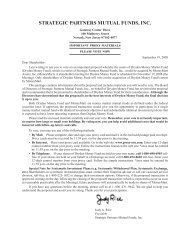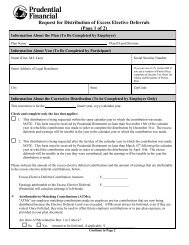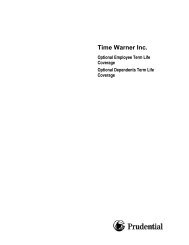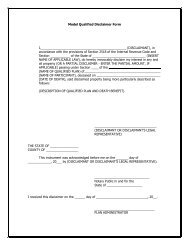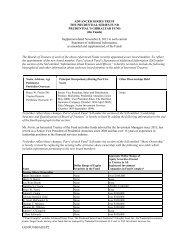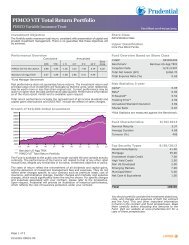- Page 1 and 2:
PRUCO LIFE INSURANCE COMPANY PRUCO
- Page 3 and 4:
UNDERLYING PORTFOLIO UNDERLYING MUT
- Page 5 and 6:
UNDERLYING PORTFOLIO UNDERLYING MUT
- Page 7 and 8:
ii. To the list of available variab
- Page 9 and 10:
II. NEW OPTIONAL BENEFITS This supp
- Page 11 and 12:
that may periodically transfer your
- Page 13 and 14:
Anniversary, we identify the Unadju
- Page 15 and 16:
Non-Lifetime Withdrawal Feature You
- Page 17 and 18:
▪ If annuity payments are to begi
- Page 19 and 20:
(iv) our receipt of Due Proof of De
- Page 21 and 22:
Example (assume the income basis is
- Page 23 and 24:
taken first from your own Account V
- Page 25 and 26:
While Spousal Highest Daily Lifetim
- Page 27 and 28:
** In this example, the first daily
- Page 29 and 30:
▪ Any Lifetime Withdrawal that yo
- Page 31 and 32:
to the death claim and the payment
- Page 33 and 34:
ages 59 1 ⁄2 to 64; 4.5% for ages
- Page 35 and 36:
Example of proportional reductions
- Page 37 and 38:
In general, withdrawals made from t
- Page 39 and 40:
certain in order to comply with the
- Page 41 and 42:
Upon termination of Highest Daily L
- Page 43 and 44:
Key Feature - Annual Income Amount
- Page 45 and 46:
Example of dollar-for-dollar reduct
- Page 47 and 48:
Highest Daily Death Benefit A Death
- Page 49 and 50:
newly-elected benefit will commence
- Page 51 and 52:
How Spousal Highest Daily Lifetime
- Page 53 and 54:
[THIS PAGE INTENTIONALLY LEFT BLANK
- Page 55 and 56:
[THIS PAGE INTENTIONALLY LEFT BLANK
- Page 57 and 58:
[THIS PAGE INTENTIONALLY LEFT BLANK
- Page 60 and 61:
The Prudential Insurance Company of
- Page 62 and 63:
COMBOSUP2 ADVANCED SERIES TRUST Sup
- Page 64 and 65:
Subadvisers Investment Categories a
- Page 66 and 67:
STYLE/ TYPE Asset Allocation COMBOS
- Page 68 and 69:
GENPROD2 PRUCO LIFE INSURANCE COMPA
- Page 70 and 71:
PRUCO LIFE INSURANCE COMPANY PRUCO
- Page 72 and 73:
In the section titled “Investment
- Page 74 and 75:
PRUCO LIFE INSURANCE COMPANY PRUCO
- Page 76 and 77:
Advanced Series Trust AST Academic
- Page 78 and 79:
DEATH BENEFITS ....................
- Page 80 and 81:
Guarantee Period: The period of tim
- Page 82 and 83:
C SERIES There is no CDSC or other
- Page 84 and 85:
OPTIONAL BENEFIT ANNUALIZED OPTIONA
- Page 86 and 87:
OPTIONAL BENEFIT ANNUALIZED OPTIONA
- Page 88 and 89:
UNDERLYING PORTFOLIO UNDERLYING MUT
- Page 90 and 91:
EXPENSE EXAMPLES These examples are
- Page 92 and 93:
Please see “Investment Options,
- Page 94 and 95:
INVESTMENT OPTIONS The Investment O
- Page 96 and 97:
INVESTMENT OBJECTIVES/POLICIES ADVA
- Page 98 and 99:
INVESTMENT OBJECTIVES/POLICIES AST
- Page 100 and 101:
INVESTMENT OBJECTIVES/POLICIES AST
- Page 102 and 103:
INVESTMENT OBJECTIVES/POLICIES AST
- Page 104 and 105:
INVESTMENT OBJECTIVES/POLICIES AST
- Page 106 and 107:
INVESTMENT OBJECTIVES/POLICIES AST
- Page 108 and 109:
group (Group II) our “Custom Port
- Page 110 and 111:
For the Long-Term MVA Option, a Gua
- Page 112 and 113:
FEES, CHARGES AND DEDUCTIONS In thi
- Page 114 and 115:
Settlement Service Charge: If your
- Page 116 and 117:
additional Purchase Payments, unles
- Page 118 and 119:
Please note the following additiona
- Page 120 and 121:
MANAGING YOUR ACCOUNT VALUE There a
- Page 122 and 123:
Please Note: Contracts managed by y
- Page 124 and 125:
ACCESS TO ACCOUNT VALUE TYPES OF DI
- Page 126 and 127:
prior to age 59 1 ⁄2 if you elect
- Page 128 and 129:
ANNUITY OPTIONS Annuitization invol
- Page 130 and 131:
LIVING BENEFITS Pruco Life offers d
- Page 132 and 133:
Income 2.0 may be appropriate if yo
- Page 134 and 135:
subsequent Purchase Payments and wi
- Page 136 and 137:
make will be the first Lifetime Wit
- Page 138 and 139:
certain in order to comply with the
- Page 140 and 141:
transfer all amounts held in the AS
- Page 142 and 143:
Example: Assuming the Target Ratio
- Page 144 and 145:
If you elect Highest Daily Lifetime
- Page 146 and 147:
If the Annuity permits additional P
- Page 148 and 149:
If you have not made a Lifetime Wit
- Page 150 and 151:
▪ Spousal Highest Daily Lifetime
- Page 152 and 153:
Required Minimum Distributions See
- Page 154 and 155:
▪ One Annuity Owner, where the Ow
- Page 156 and 157:
effective date of the benefit, the
- Page 158 and 159:
Highest Daily Lifetime Income 2.0 w
- Page 160 and 161:
▪ The Annuitant was 70 years old
- Page 162 and 163:
▪ Please note that if your Unadju
- Page 164 and 165:
The benefit automatically terminate
- Page 166 and 167:
(c) all Purchase Payments (includin
- Page 168 and 169:
▪ Both designated lives were 70 y
- Page 170 and 171:
Required Minimum Distributions See
- Page 172 and 173:
newly-elected benefit will commence
- Page 174 and 175:
GUARANTEED RETURN OPTION PLUS II (G
- Page 176 and 177:
time. The formula determines the ap
- Page 178 and 179:
Value” above for more details). Y
- Page 180 and 181:
HD GRO II uses a predetermined math
- Page 182 and 183:
Any amounts invested in the AST bon
- Page 184 and 185:
DEATH BENEFITS TRIGGERS FOR PAYMENT
- Page 186 and 187:
Calculation of Highest Anniversary
- Page 188 and 189:
A surviving spouse’s ability to c
- Page 190 and 191:
VALUING YOUR INVESTMENT VALUING THE
- Page 192 and 193:
TAX CONSIDERATIONS The tax consider
- Page 194 and 195:
Taxes Payable by Beneficiaries The
- Page 196 and 197:
A Nonqualified annuity may also be
- Page 198 and 199:
In any event, you must begin receiv
- Page 200 and 201:
ERISA Requirements ERISA (the “Em
- Page 202 and 203:
out of any other business we may co
- Page 204 and 205:
Cost Averaging, auto rebalancing, a
- Page 206 and 207:
Infinex Investments, Inc. ING Finan
- Page 208 and 209:
County, Illinois, was served on Pru
- Page 210 and 211:
[THIS PAGE INTENTIONALLY LEFT BLANK
- Page 212 and 213:
Sub-Accounts Accumulation Unit Valu
- Page 214 and 215:
Sub-Accounts Accumulation Unit Valu
- Page 216 and 217:
Sub-Accounts Accumulation Unit Valu
- Page 218 and 219:
Sub-Accounts Accumulation Unit Valu
- Page 220 and 221:
Sub-Accounts Accumulation Unit Valu
- Page 222 and 223:
Sub-Accounts Accumulation Unit Valu
- Page 224 and 225:
Sub-Accounts Accumulation Unit Valu
- Page 226 and 227:
Sub-Accounts Accumulation Unit Valu
- Page 228 and 229:
Sub-Accounts Accumulation Unit Valu
- Page 230 and 231:
PREMIER RETIREMENT L SERIES Pruco L
- Page 232 and 233:
Sub-Accounts Accumulation Unit Valu
- Page 234 and 235:
Sub-Accounts PREMIER RETIREMENT C S
- Page 236 and 237:
Sub-Accounts Accumulation Unit Valu
- Page 238 and 239:
Sub-Accounts Accumulation Unit Valu
- Page 240 and 241:
Sub-Accounts Accumulation Unit Valu
- Page 242 and 243:
[THIS PAGE INTENTIONALLY LEFT BLANK
- Page 244 and 245:
Annuity Comparison X Series B Serie
- Page 246 and 247:
The shaded values indicate the high
- Page 248 and 249:
[THIS PAGE INTENTIONALLY LEFT BLANK
- Page 250 and 251:
holidays), plus the amount of any P
- Page 252 and 253:
Examples of dollar-for-dollar and p
- Page 254 and 255:
Required Minimum Distributions Requ
- Page 256 and 257:
Unadjusted Account Value and Protec
- Page 258 and 259:
equire a transfer to the Bond Sub-a
- Page 260 and 261:
to as the “LIA Amount”) if you
- Page 262 and 263:
the latter scenario, we determine w
- Page 264 and 265:
The “Periodic Value” is initial
- Page 266 and 267:
Amount on a dollar-for-dollar basis
- Page 268 and 269: Here is the calculation: Withdrawal
- Page 270 and 271: Election of and Designations under
- Page 272 and 273: [THIS PAGE INTENTIONALLY LEFT BLANK
- Page 274 and 275: holidays), plus the amount of any P
- Page 276 and 277: Examples of dollar-for-dollar and p
- Page 278 and 279: Required Minimum Distributions Requ
- Page 280 and 281: ▪ If you elect this benefit and i
- Page 282 and 283: Generally, the formula, which is ap
- Page 284 and 285: Additional Tax Considerations If yo
- Page 286 and 287: LIA Amount after the first Lifetime
- Page 288 and 289: section above entitled “How Highe
- Page 290 and 291: Highest Daily Auto Step-Up An autom
- Page 292 and 293: Non-Lifetime Withdrawal Feature You
- Page 294 and 295: apply to current participants in th
- Page 296 and 297: [THIS PAGE INTENTIONALLY LEFT BLANK
- Page 298 and 299: If the formula ratio is less than a
- Page 300 and 301: [THIS PAGE INTENTIONALLY LEFT BLANK
- Page 302 and 303: We reserve the right to waive the l
- Page 304 and 305: [THIS PAGE INTENTIONALLY LEFT BLANK
- Page 306 and 307: If the formula ratio is less than a
- Page 308 and 309: [THIS PAGE INTENTIONALLY LEFT BLANK
- Page 310 and 311: ▪ T - the amount of a transfer in
- Page 312 and 313: [THIS PAGE INTENTIONALLY LEFT BLANK
- Page 314 and 315: You can have a traditional IRA whet
- Page 316 and 317: 2. Rollovers from an employer retir
- Page 320 and 321: [THIS PAGE INTENTIONALLY LEFT BLANK
- Page 322 and 323: income, and dividend income), pensi
- Page 324 and 325: c. Made to a Beneficiary or to your
- Page 326 and 327: [THIS PAGE INTENTIONALLY LEFT BLANK
- Page 328 and 329: CONTINGENT DEFERRED SALES CHARGE 1
- Page 330 and 331: [THIS PAGE INTENTIONALLY LEFT BLANK
- Page 332: The Prudential Insurance Company of


